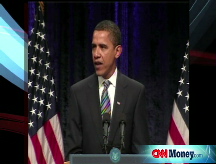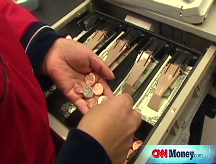For Obama, turning stimulus off won't be easy
Unions and business agree: The economy needs a jolt. But they have different views about what spending will mean. The president-elect is appealing to both.
WASHINGTON, D.C. (Fortune) -- Two groups that don't always get along, organized business and organized labor, have something in common today. They like what they see in President-elect Obama's economic recovery package.
Organized business is optimistic about the potential impact. "Very encouraged," is how Chamber of Commerce CEO Thomas J. Donohue describes his group's reaction.
And organized labor is over the moon. Across the country this week, union leaders are helping stage dozens of rallies - targeting senators and House members who don't share their enthusiasm.
With a price tag likely to top $800 billion, there's plenty for both of these traditional political rivals to offer their constituencies.
But ultimately, business and labor bring competing visions of what this massive spending will mean to the country: A temporary kick-start to a desperately sick economy, or a permanent New Deal?
The Chamber's Donohue told reporters this week that his great fear is that the initiative will evolve into a "big and permanent expansion of government payrolls and powers. We don't need and can't afford another New Deal," that eats into the wealth generated by the private sector.
But read through any one of the dozens of statements that union leaders and their liberal interest group allies have issued weekly since Obama's election, and it's clear that they see this financial crisis as a ripe opportunity to return to construct social and jobs programs that they believe are long overdue.
In his economic address on Thursday, President-elect Obama walked the fine line between both visions. "This is not just another public works program," he insisted. "Our goal is not to create a slew of new government programs, but a foundation for long-term economic growth."
He said the overwhelming majority of the three million jobs he wants to "save or create" would be in the private sector. (Lawrence Summers, chief architect of the plan and Obama's National Economic Council chair, has promised that 80% of those jobs would be in the private sector.)
Obama promises an "unprecedented" routing of wasteful government spending and a transparency process that will put details of his new spending online for public review. On Wednesday, he appointed a McKinsey & Co. director, Nancy Killefer, as his top cop to monitor the hundreds of billions to be spent.
But the Obama plan is also defiantly long-term: doubling the production of alternative energy, outfitting public buildings with energy efficient windows and insulation, constructing a "smart grid," investing in science and research and schools, building and repairing roads and bridges. The broad sweep of his plan begs the question: Once the federal spigot is turned on for these projects, however worthy each may be, how does it get shut off?
As Washington veterans well know, "temporary" doesn't usually appear in Congress' vocabulary - since every program comes with a built-in, and generally noisy, constituency. It took Congress 108 years to eliminate a 3% excise tax on long-distance calls - a levy imposed on "the wealthy" in 1898 to help fund the Spanish-American War.
A wide range of economists - including conservatives who met with Republican senators Wednesday - agree that the U.S. economy needs a massive injection of Keynesian-style spending to avoid a freefall.
A top Obama economic adviser, Christina D. Romer, studied post-World War II recessions in academia and concluded that monetary policy has fueled most recoveries, while past fiscal actions "have almost always been too small to contribute much to economic recovery."
With the Federal Reserve running out of rescue tools, government spending - but only on a scale massive enough to boost America's nearly $14 trillion economy - has become the favored alternative. As Summers wrote in the Washington Post: "In this crisis, doing too little poses a greater threat than doing too much."
But consideration of an economic recovery package that could cost upwards of $1 trillion after Congress adds on its own goodies comes at a time when the U.S. government already faces a record $1.2 trillion deficit for the current fiscal year. Add to that the crushing debt-load looming around the corner from over-extended entitlement programs such as Social Security and Medicare - and even big-spending lawmakers are getting worried.
So far, Obama has been characteristically astute about selling his plan - even before it has been formally unveiled. Details of business tax breaks to be included were leaked early this week, a clever political move that simultaneously built support in the corporate community while weakening likely opposition from Republican lawmakers.
There isn't full agreement on what exactly these tax breaks should look like - the Chamber is pushing a plan to suspend taxes on companies that buy back their debt and says that Obama's plan to give $3,000 tax credits for new hires by private firms is unworkable.
But business lobbyists were pleasantly surprised that tax breaks - for individuals and businesses - would account for 40% of the package's total cost.
With that kind of groundwork, Obama will almost certainly get his stimulus package through Congress. His hardest job will be fulfilling the high bar on implementation he has set for himself. His administration "won't just throw money at our problems," Obama said Thursday. "We have to make tough choices and smart investments today so that as the economy recovers the deficit starts to come down." ![]()
-
 The retail giant tops the Fortune 500 for the second year in a row. Who else made the list? More
The retail giant tops the Fortune 500 for the second year in a row. Who else made the list? More -
 This group of companies is all about social networking to connect with their customers. More
This group of companies is all about social networking to connect with their customers. More -
 The fight over the cholesterol medication is keeping a generic version from hitting the market. More
The fight over the cholesterol medication is keeping a generic version from hitting the market. More -
 Bin Laden may be dead, but the terrorist group he led doesn't need his money. More
Bin Laden may be dead, but the terrorist group he led doesn't need his money. More -
 U.S. real estate might be a mess, but in other parts of the world, home prices are jumping. More
U.S. real estate might be a mess, but in other parts of the world, home prices are jumping. More -
 Libya's output is a fraction of global production, but it's crucial to the nation's economy. More
Libya's output is a fraction of global production, but it's crucial to the nation's economy. More -
 Once rates start to rise, things could get ugly fast for our neighbors to the north. More
Once rates start to rise, things could get ugly fast for our neighbors to the north. More









